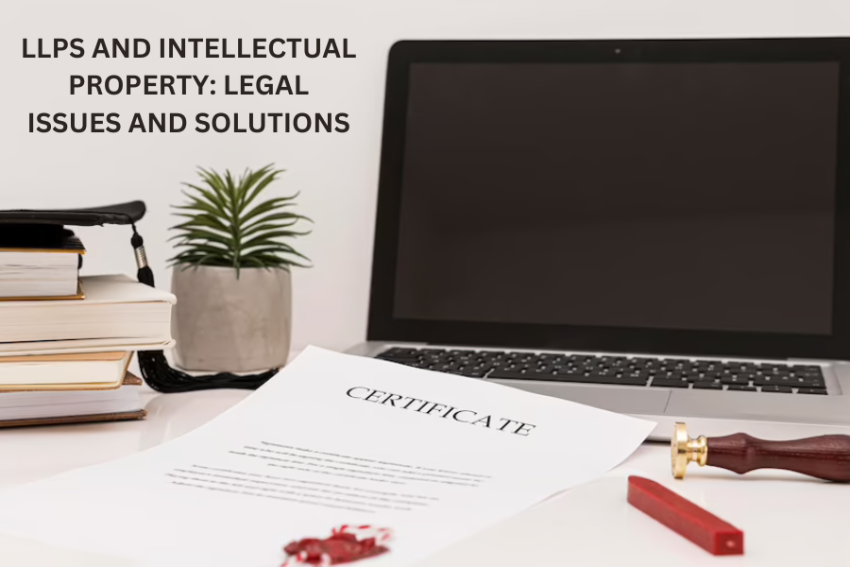LLPs or Limited Liability Partnerships are a popular business structure in India for entrepreneurs and professionals. They combine the flexibility of a partnership firm with the limited liability protection of a private limited company. Online LLP registration has made it easier for startups and small businesses to incorporate an LLP and start their operations. However, one critical area that LLPs need to focus on is intellectual property or IP. Intellectual property is a crucial asset for any business, and it includes trademarks, patents, copyrights, and trade secrets. In this article, we will discuss the legal issues and solutions related to LLPs and intellectual property.
Types of intellectual Property Rights for LLPs
Intellectual property rights or IPRs are legal rights that protect the creations of the human mind. These creations can be literary, artistic, scientific, or industrial, and they include trademarks, patents, copyrights, and trade secrets. IPRs give their owners exclusive rights, such as, to use, exploit, and commercialize their creations. In the case of LLPs, IPRs are critical assets that can differentiate their products and services from those of their competitors. For example, a unique logo, brand name, or invention can create a strong brand identity and increase the market value of an LLP.
Trademark Registration for LLPs
Trademark registration is one of the most important IPRs for an LLP. A trademark is a unique symbol, design, or combination of both that represents the brand identity of a business. Trademarks can be registered for products, services, or both, and they give their owners the exclusive right to use the mark in the market. Online LLP registration makes it easier for LLPs to apply for trademark registration, as they can do it online through the Trademark Registration Portal of India. Trademark registration is essential for LLPs to protect their brand name, logo, and other distinctive features from being copied or imitated by their competitors.
Patent Registration for LLPs
Patent registration is another important IPR for LLPs, especially for those in the technology or manufacturing sectors. A patent is a legal document that gives its owner the exclusive right to make, use, and sell an invention for a specified period. Patent registration requires a detailed description of the invention, along with its claims and drawings. Online LLP registration does not allow for patent registration, as it is a specialized process that requires the services of a patent attorney or agent. However, LLPs can collaborate with inventors and file patent applications jointly to protect their inventions and innovations.
Copyright Registration for LLPs
Copyright registration is relevant for LLPs that create original literary, artistic, or musical works, such as software, books, or music. It gives its owner the exclusive right to reproduce, distribute, and display the work in public. Online LLP registration allows for copyright registration, as it can be done through the Copyright Registration Portal of India. Copyright registration is essential for LLPs to prevent their works from being copied, pirated, or plagiarized by others.
Trade Secret Protection for LLPs
Trade secret protection is another important IPR for LLPs, especially those that deal with confidential or proprietary information. They are confidential information that gives its owner a competitive advantage over others. Examples of trade secrets include customer lists, manufacturing processes, formulas, and designs. Online LLP registration does not provide for trade secret protection, as it is a legal concept that requires the implementation of proper policies and procedures to protect confidential information. LLPs can use non-disclosure agreements (NDAs) and confidentiality clauses in their contracts and agreements to protect their trade secrets.
Legal Issues related to LLPs and IP
Ownership of IP
Firstly, as an LLP is a separate legal entity, it is essential to determine the ownership of IP between the partners and the LLP. While the LLP registration may have been done in the name of the partners, the IP rights may be owned by the LLP.
Infringement
Secondly, LLPs must ensure that their IP rights are not infringed upon by third parties. Infringement can happen when a third party uses an LLP’s trademark or copyrighted work without permission.
Non-disclosure agreements
Thirdly, LLPs must use Non-Disclosure Agreements (NDAs) to protect their trade secrets. NDAs can be used with employees, vendors, and suppliers to prevent them from disclosing confidential information about the LLP.
Licensing Agreements
Finally, licensing agreements allow an LLP to grant permission to a third party to use its IP rights. The agreement must include details of the license fee, the scope of the license, and the duration of the license.
Solutions to Legal Issues related to LLPs and IP
IP ownership agreements
LLPs should have IP ownership agreements that specify the ownership of IP between the partners and the LLP. The agreement should also specify the rights and obligations of the partners and the LLP in relation to the IP.
Trademark registration
LLPs must register their trademarks to protect their brand name and logo. Trademark registration provides exclusive rights to use the trademark and prevents others from using it.
Copyright registration
LLPs should register their original works of authorship, such as software, literary works, and artistic works. Copyright registration provides exclusive rights to reproduce, distribute, and display the copyrighted work.
Patent registration
If an LLP has invented something new and non-obvious, it can obtain a patent for it. Patent registration provides exclusive rights to make, use, and sell the invention.
Use of NDA
LLPs must use NDAs to protect their trade secrets. All employees, vendors, and suppliers who have access to confidential information about the LLP should sign NDAs.
Use of Licensing Agreements
Licensing agreements allow an LLP to grant permission to a third party to use its IP rights. The agreement should include details of the license fee, the scope of the license, and the duration of the license.
Conclusion
In conclusion, it is essential for LLPs to pay close attention to their intellectual property assets and take necessary measures to protect them. Failure to do so can result in significant financial losses and damage to the company’s reputation. Hence, seeking the guidance of legal experts in IP law can be beneficial in avoiding legal disputes and securing the company’s intellectual property assets.
Online LLP registration has made the process of starting a business more convenient than ever before. However, it is crucial to remember that the legal aspects of running an LLP remain just as important as they were before. By being aware of legal issues related to intellectual property and accordingly implementing necessary measures to protect their assets, LLPs can ensure their long-term success and growth.

